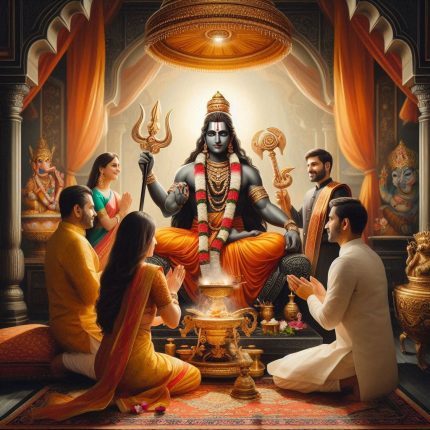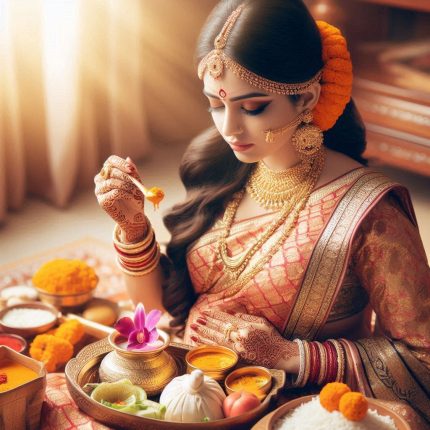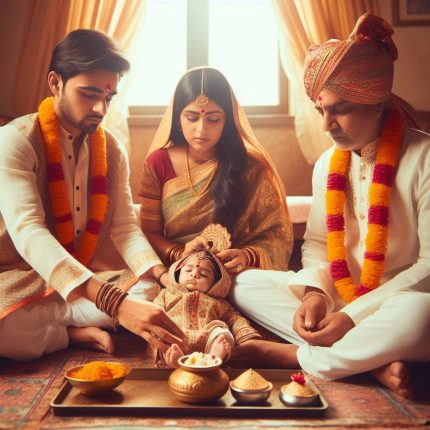Samagri
for Puja:
Haldi [organic] (20gm), Kumkum [organic] (20gm), Tulsi Mala (1), Diya Batti (5), Beetle Nuts (5), Desi Ghee (20ml), Honey (20ml), Jaggery (Gudh) (20gm), Akshata [Yellow rice] (20gm), Yagno-paveetha (5), Karpoora [camphor] (5Tabs), Red/White/Yellow Cloth(1 mtr), Prasad [Laung, Elaichi, Mishri] (20gm), Mouli (25mtr), Ganga Jal (15ml), Durva [fresh] (1), Agarbatti (6)/Dhoop (2), Dakshina (100INR), God Idols (pair), Sambrani (2), Sambrani Holder (1), Kalash [small copper] (1), Panchpatra [small copper] (1), Diya Holder (2), Panchamrit spoon (1), Karpoora Holder(1), includes perishables [Beetle Leaves [fresh] (9), Flowers [fresh] (incl mala), Tulsi [fresh], Mango Leaves [fresh] (7)]
Small Havan:
Cow Dung Cake (2), Mango Wood (250gm), HavanSamagri [20+ Grganic Herbs] (100gm), Ghee (20ml)
Yajman to provide:
Curd (100gm), Milk (100ml), Mithai (250gm), Fruits [5types], Coconut (1), HavanKund, SuchiSarva (Havan Spoon) (1), Kalash [big] (1), Bowl [preferably copper/silver] (1), Spoon [preferably copper/silver] (1), Utensils [2 big Plates (for Aarti/Samagri), disposable Plates, Bowls & Spoons], First solid food (preferably Kheer or Payasam)
Importance and Significance of Namkaran Puja
The Namkaran ceremony is rooted in the belief that a name carries energy and influences a person’s destiny. By selecting a meaningful name during this ritual, parents aim to provide their child with a positive and auspicious start in life. The puja not only honours the child’s identity but also expresses gratitude for the divine gift of life.
Benefits of Namkaran Puja
- Divine Blessings: The puja invites blessings for the child’s health, happiness, and prosperity throughout their life.
- Cultural Connection: It reinforces the family’s cultural identity and traditions, passing values from one generation to the next.
- Community Bonding: The ceremony strengthens family ties and creates a supportive community as loved ones gather to celebrate.
- Positive Energy: The ritual is believed to infuse the child’s life with positive energy, setting a hopeful tone for their future.
Occasions to Perform Namkaran Puja
Namkaran Puja is traditionally performed on the 11th day after the child’s birth, but this timing can vary based on family customs and astrological recommendations. Some families may choose to conduct the ceremony on auspicious days or during special festivals.
Namkaran Puja Vidhi (Procedure)
- Preparation: The family prepares for the puja by dressing the child in traditional attire and gathering necessary items for the ceremony.
- Setup: A sacred space is arranged with an altar featuring images of deities, along with offerings such as flowers, fruits, and sweets.
- Invocation: The ceremony begins with the invocation of Lord Ganesha to remove obstacles and ensure a successful puja.
- Offering Prayers: Parents offer heartfelt prayers, expressing gratitude for the child’s birth and seeking divine guidance in selecting the name.
- Name Selection: The chosen name is revealed during the ceremony, often accompanied by the chanting of specific mantras that carry the essence of the name’s meaning.
- Blessings from Elders: Family members and elders present bestow their blessings, sharing good wishes for the child’s future.
- Celebration: The puja is followed by a celebration with family and friends, sharing joy, food, and love.
- Prasad Distribution: The ritual concludes with the distribution of prasad (blessed food), symbolizing shared blessings and community spirit.
Namkaran Puja Shubh Muhurat
Selecting an auspicious time for Namkaran Puja enhances its spiritual significance. Consulting with an astrologer can help identify the most favourable timing based on the child’s birth chart and planetary alignments.
By engaging in Namkaran Puja, families honour their child’s identity and invoke blessings for a bright future. This sacred ritual not only celebrates the arrival of a new life but also strengthens familial bonds and cultural heritage, creating a supportive foundation for the child’s journey ahead.






